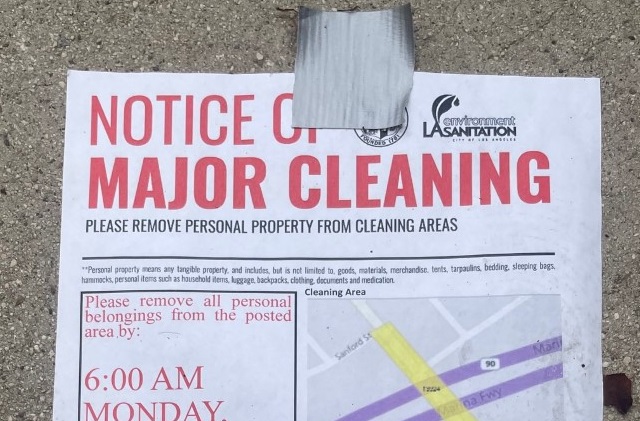The proliferation of transient camps is a prime issue for Angelenos this election year. Despite voting for services and funding to the homeless, these camps seem to keep spreading with no end in sight. Why isn’t the city doing anything about them? What can we do about them?
We’ve heard several causes – lack of affordable housing, Martin vs Boise, mental health issues, drugs, etc. But the heart of the issue can be distilled to a very simple policy soundbite: “Services not Sweeps.” The very term is a euphemism and misnomer. Angelenos overwhelmingly agree that the city should have services ready for anyone who needs them. We passed Props H and HHH, which provides billions to this enterprise. The services are there.
But behind that is the basic legal question:
If we have somewhere to send a transient, but they don’t want to move, can we compel them? Or are we stuck with them, wherever they decide to homestead, until they voluntarily leave?
That’s the key part of the phrase – “not sweeps.” The idea is cleaning up transient camps – “sweeps” – cause trauma by uprooting transients and keeping them on the move. Therefore, we should not compel them to move. Needless to say, this policy means allowing transient camps to permanently fester and metastasize. People know what this means. Festering drug dens, disease, crime, as camps continue to rot with no sanitation.
Yet a surprising number of officials and candidates subscribe to this policy. In fact “services not sweeps” is the default progressive position, as with professional activist group Democratic Socialists of America.
Fortunately, many candidates for 2022 have stepped forward arguing against this. This gives us an opportunity to defeat candidates who would force us to live with permanent transient camps in 2023 and on.
Professional activists have been fighting with residents on this issue for the past few years. An example is “how many times can someone refuse services before we can finally compel them?” Their answer is never.
Another trick they use is claiming that the city has fewer beds than counted homeless. Therefore, since we don’t have enough beds to house every homeless person in the city, we cannot enforce any cleanups. But if the vast majority of beds lays empty, and the vast majority of transients don’t want to go into a shelter, then building more beds doesn’t fix the problem.
Culver City will see Alex Fisch and Daniel Lee’s seats go up for re-election this year. At the recent Culver City Democratic Club forum, both Alex Fisch and Freddy Puza have come out against encampment sweeps. Denice Renteria was the only candidate at that forum not to oppose them flat-out. Dan O’Brien also supports a no-camping ordinance throughout the city, once the city purchases the hotels as shelters.
This issue is intentionally loaded, with legal ramifications for supporting sweeps . We will get clarification from all candidates on where they stand and the implications of their position – namely with regards to the persistent camp at the Senior Center.
We’re also seeing several races at the city, county and state level that will decide this issue. Here’s our analysis on them and whether the candidates are for or against “services not sweeps.” Again, being for “services not sweeps” means they don’t think we can compel transients to move. Being against it means they think we can and should.
LA city Mayor: Karen Bass for, Rick Caruso against
LA city council 11: Erin Darling for, Traci Park against
LA city council 13: Hugo Soto-Martinez for, Mitch O’Farrell against (this is Echo Park Lake, which O’Farrell cleaned up to the vocal opposition of activists)
LA County Sheriff: Alex Villanueva (incumbent) against, Robert Luna for. Villanueva has been instrumental in keeping Venice Boardwalk clear of camps.
Assembly District 55: Isaac Bryan for, Keith Cascio against
Senate District 28: Lola Smallwood-Cuevas for, Cheryl Turner against (ACLU put out a legally dubious mailer in support of Cuevas on this precise issue, claiming sweeps “result in the disproportionate policing of transgender women of color”)
Congressional District 37: Sydney Kamlager for, Jan Perry against
Practically all these races are highly competitive. We also expect the primary results to be skewed to the left, as the Democrat Socialists of America spent an aggressive effort to get out the vote for their candidates. The primary had very low turnout overall, so these kinds of efforts can have a disproportionate effect.

